#and that experience radicalized him more
Explore tagged Tumblr posts
Text
Not to be really annoying and go ‘well actually’ to the joke about how silcos a twink who probably didn’t do shit in the mines and that miners all look like vander and are these big buff burly dudes is very much some propaganda in ur brain and not the reality of what conditions are like for miners from impoverished communities. You know they use children in mines bc they’re small right. If you’ve consumed any footage showing messed up mining communities that exists irl, like people who work in cobalt mines in Congo, they’re muscular, but at a glance, they’re not jacked and look pretty average. I think a lot of people are surprised seeing that they tend to be small and lanky for people doing hard manual labor all day, but that comes from not being able to afford enough quality food. You have to eat a ton of calories to get built, and that isn’t something many people who work in mines have.
#in this essay I would like to posit the theory that part of why silco became a crueler revolutionary than vander is#bc he experienced a more impoverished up bringing while vander had access to secure food and shelter#and that experience radicalized him more#I know it’s not real and it doesn’t matter BUT HEAR ME OUT the experience of being in an inherently weaker body created by the material#conditions living in an apartheid state where you’re forced into manual labor is a VERY INTERESTING characterization for your villain so#I love a villain who ends up evils bc really after a certain amount of bullshit they have no choice#which isn’t to say they’re right but serves to show how bad the system is#thank you for coming to my Ted talk#arcane#silco#vander#personal
155 notes
·
View notes
Text
Season 8 was like 6 years ago(I feel old) and I know ppl have differing opinions on the Mr Echo thing (but it was intended, made it to storyboard and blocked animation and then dropped, soooo) but. I can see his recruitment p easily tbh. Bc the whole reason Dr J was in that lighthouse was because he was resurrected, forced there, and ordered to build Skulkin vehicles by Samukai. But Samukai in the flashback we see has already been deposed as leader of the Skulkin/Underworld. Which means the orders to do so most likely came from Garmadon.
And since Mr. E is one of the head honchos, he's likely an early arrival to the team, so I don't think Harumi has a whole lot figured out at this point, she's just got her Trauma and some Bad Influence Friends and an obsession with Lord Garmadon. So. Like. Plausible deniability road trip that she's just visiting important markers of Ninjago's recent past, all of which involve Lord Garmadon in some meaningful way; its sightseeing, its cathartic, and it gives her time to develop her dream Motorcycle Gang/Resurrection Cult. She's not looking for anyone at the Lighthouse, but she is looking for vehicle blueprints so she can be the Koolest leader on the block. But oops she looks in the basement and there's an Echo.
And she's flipping out bc??? A Ninja???? In the Lighthouse basement??? I mean it makes sense that it would be this one but???
Except this rusty old robot has no idea what she's talking about with this Ninja stuff, he's just waiting for his dad to come back.
And Harumi pauses.
Because how long has he been waiting? He's not sure, he had no proper way to measure time in the basement, and he doesn't have the best view of his clockwork heartpiece. But it was after his father saw a strange ship docking; Echo was worried it was the People who had locked up his father in the first place, but instead his dad sounded happy when he saw whoever was out there. It could have been a front, though, as clearly it was never safe to let Echo back out. Then Dr J popped down briefly, while everyone above was resting, to tell Echo he was desperately needed elsewhere, that it wasn't safe to bring Echo, but that he'd be back in no time.
And the pieces are fitting together for Harumi. And she's like. Your dad's dead, bro.
And he's like. What? Did he die doing what was needed of him?
And she's like. Oh, no. He died a few years later.
And he's like. Why didn't he come back for me????
And she's like. Probably because they kept him away.
And he's like. Who's they?
And she's like. The Ninja I was talking about earlier.
And it surely can't be hard in universe to find pictures of Zane and Dr J post s2-pre s3, so she pulls one up and shows Echo who is freaking out bc why is that one kind of like him and Harumi explains that that was the droid his father created first, that he became a Ninja, and that hes probably the one who took their father away and kept echo waiting for years.
But Echo has doubts, shocked as he is abt a new older brother, he wants to believe the good in the situation so he's unsure. But Harumi mentions that the Ninja's failures to uphold more than their self preservation/interests has led to uncountable losses and devastation in Ninjago time and time again, before delving into her own story. And she seems so kind, and so hurt, and I do think there's a genuine connection btwn these two that forms from this shared emotional torment that they decide came from the Ninja, and now Echo is more receptive.
And then Harumi gets to start her Garmadon pitch because wait! If Echo was made here, then that could only have happened because of Lord Garmadon. And she reiterates that he's the reason she and her city could have even survived The Great Devourer. And maybe Echo's family-by-creation left, maybe they were untrustworthy and lacking, but that's OK bc if you look at it all a certain way, Garmadon is more of a father to Echo than Dr J was. And Echo is a vulnerable, overwhelmed mess who just found out his dad fucked off for years without him and also died, and also he has a brother??? Who their dad clearly seems to have favored??? Did they even know about Echo??? Did they delight in their life free of him???
Basically. Kinda Spinel-core but getting abandoned and left completely alone does that to you. Especially when the first person to find you after being abandoned is a deeply hurt and misguided teen who is probably kinda desperate for someone, anyone else to see the Ninja the way she sees them.
#i was thinking abt the idea of citrusshipping#and how it could have flowed into Mr Echo. with morro as the vengeful influence tinting these#one sided experiences to associate ninja with loss#but theni was like 'wait a sec tho bc Harumi does that also and its her gang called the sons of garmadon#and if youre very carfeully squinting and cherrypicking out pesky details and nuance. like harumi would be.#echos existence is thanks to Lord Garmadon. and there is no better replacement dad than garmadon. you should be a son of garmadon.#and echo would probably listen and she could get him out the lighthouse and off the island'#and anyway i kinda ship Harumi and Echo now?#i like citrusshipping its funney but i think i actually ship this dynamic now#its. fucked and manipulative but its also like. genuine and just. two scarred young people and harumi gives echo her distorted view#of the world as the gift of her love#so its like she wasnt trying to manipulate echo. not like she was trying to manipulate Lloyd.#but she did take someone in a v fragile state and begin shaping his worldview to match hers. unconciously but still done.#like i can also see her bringing him to the mainland and she and UV and Killow are his tethers which means everything he sees radicalizes#him further...and draws him in closer to the fold#anyway if he and harumi smoochie kiss then shes why he got rebuilt in Crystallized. also i think mr F stands for 'Mr Fun Guy'#echo zane#harumi jade#ninjago harumi#quietmystery?#idk what the ship name would be but im here for it#mr e ninjago#mr echo#echo/harumi#tbh i said i kinda ship it now but it could also be friendship#sons of garmadon#...ok til abt the morro-echo-harumi trio hcs and Yes#this is just more of a like. canon compliant ish take where morro is still gone from the narrative#love the idea of the 3 in a vengeance trio tho
38 notes
·
View notes
Text
I have to resurrect my tumblr from the dead for my thoughts on the new Superman movie:
THIS WAS AN AMAZING MOVIE. THAT WAS SUPERMAN.
He’s corny, he’s midwestern, he’s a nerd and everyone kind of bullies him for it. He says things like “what the hay dude” or “I’m punk rock- I’m totally punk” completely seriously. He takes several extra precious seconds to save a squirrel. He’s ready to fly headfirst into danger to save his dog because the dog’s probably “scared and all alone” even though it’s not a particularly good dog all the time. He loves his parents. He has bad band posters hanging in his childhood bedroom. He takes the time to calm a lady on a rooftop in the middle of a fight. He cares.
As for the actual plot- it’s really difficult to make a Superman movie feel high stakes, especially while trying to keep it real. In the comics Superman gets into situations it would be nearly impossible to show on screen, like fighting in front of a black hole, but somehow this movie makes it work. James Gunn tapped into his experience making Guardians of the Galaxy and it shows in the best way possible. You find yourself wondering how in the world Superman is going to win- and that’s what makes this such an amazing superhero movie.
Superman’s true weakness isn’t kryptonite, it’s thinking and planning ahead. All the villains that beat him in the comics match his brawn, but have the brains to get an edge and have better fight strategy. All superman knows is that “people were going to die” and since he’s such an unbelievably GOOD guy, that’s all that matters to him. We saw it when the “justice gang” was helping him fight the alien monster and we saw it in Louis’s interview. When you have a superhero with barely any weaknesses, you need something more than the threat of losing a fight to make him interesting.
Now for Lex- no notes. He was brilliantly written. It can be difficult to take his character seriously, but that speech at the end where he was screaming to be recognized because, to him, humanity’s ability to overcome odds and achieve through innovation is critical and Superman’s existence risks overshadowing that? That was deadly serious.
Last serious note- I’m glad they kept it political. The United States government being scared of an alien and the threat of invasion despite the fact that Superman has done nothing but help them? A billionaire approaching the government to encourage foreign intervention because it will allow him to profit? A foreign power that the U.S. is officially allied to even though everyone knows they’ve committed horrible war crimes but nobody actually KNOWS that and the smaller neighbor they’re threatening to wipe out in order to “free” them from an oppressive regime? Superman declaring that he’s just like everyone else, that he’s human too and that’s his greatest strength? The idea of radical love? Yeah.
FINAL NOTE: I think that a scene from this movie sums up what I got from it very well. It’s when Louis is talking about how Clark isn’t punk rock. She says that he trusts everyone he’s ever met and he thinks that everyone is beautiful. And he responds: “maybe that’s punk rock.” He’s right. It is. And that’s Superman.
Anyways…good movie. Go watch it.
#superman 2025#superman#dcu comics#dc comics#dc cinematic universe#james gunn#superman movie#clark kent
8K notes
·
View notes
Text
There’s some common threads I see in the anti-voting posts going around, and I feel like I need to discuss some of them. Let’s start with the biggest one:
Voting to punish evil. I see lots of variations of this. Biden is supporting Israel, therefore we can’t vote for him. Is there any viable candidate who would stop the genocide? I don’t think the anti voting crowd actually cares. They are appealing to moral feelings rather than political strategy, because strategically, you have to realize that voting is not going to change foreign policy, and that change has to be pushed by other means. It’ll probably be something in the long haul.
Democrats should run someone else. First of all, this is a shit strategy. You don’t primary your president in the second term unless your party is falling apart. This may come from people from countries where replacing the head of government is easier, but the POTUS is the de facto party head. Also, going to the lack of thought to the goal — do you know someone willing to primary Biden and able to win who would do the things you want?
Biden hasn’t done anything anyway. This is just a way to bat away pro arguments. There’s plenty of lists of progress on lots of things. Student loans, insulin price caps, regulations, anti-trust.
Putting the entire Palestinian genocide on Biden. I’m not saying there’s not culpability there, but understand that the entire US government is in support of Israel, on both sides. It was a miracle we got a handful of Senators to call for investigations. We should cut off aid, absolutely. Who’s running to do that? And keep in mind that Israel chose to engage. US officials would have liked a more limited response, not out of care for Palestinians, but because they know from experience that it will come back to bite Israel in the form of newly radicalized Hamas recruits.
Liberals just have no hope for change. This is a new one. Just some idea that people are stuck in a rut and that’s the reason the two party system exists. The two party system is a mathematical consequence of the way we vote. There is reason to hope for change. The change, though, whatever means you choose, will take decades. Keep working at it. The hope is not that this election will fundamentally change things. The hope is that many small political actions over the years will push things forward.
Funnily enough, I haven’t seen a whole lot of third party promotion, just lots of this rhetoric aiming to punish. When voting, ask yourself:
Is this problem I have with this candidate something that the other candidate would be better on?
Are there other political actions I can take that will help?
What things can change with a different President or Congress, and what needs to be pursued by other means?
Withholding your vote as a punishment isn’t really going to help. Biden doesn’t know who you are or why you are not voting for him, and there is no one with a chance of winning that will do everything you want. But you have other means. Protest, organize, donate, build up alternatives, advocate for a different system.
Vote to give yourself space and get a little bit. Do other things to keep things moving.
14K notes
·
View notes
Text
got a bunch of messy doodles!
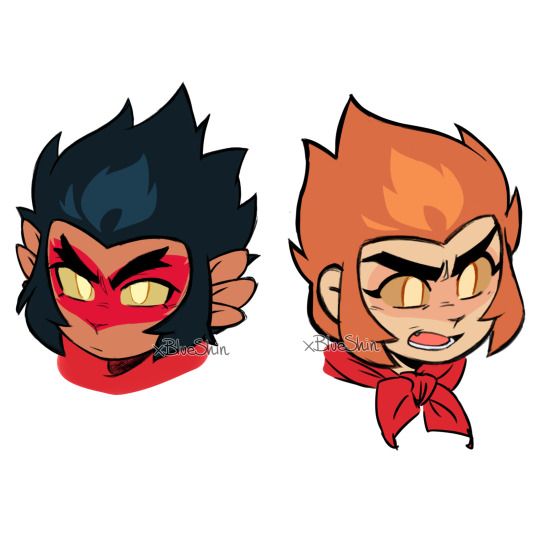
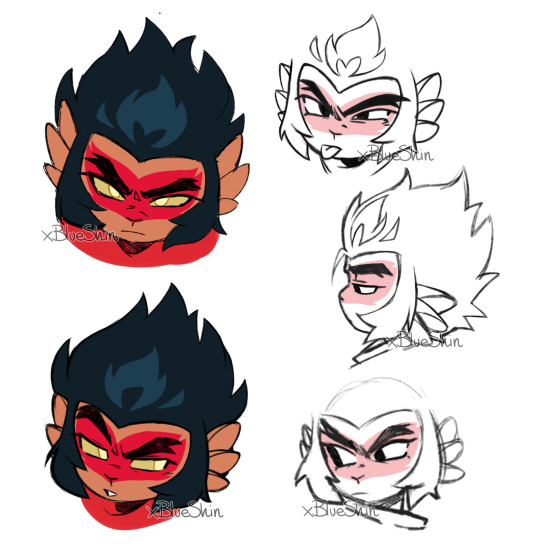

I love drawing in the Lego Monkie Kid style, but I want to also develop a style that's more "mine" I'm still experimenting around what I like best; I'm not 100% sure yet.
I wanted to have 2 styles because:
1. It's fun to experiment around (even though the very first stage of figuring out how to draw a character can be frustrating, lol).
2. Last time I've drawn characters in a radically different style from mine (the sonic characters) for a long while, I went back trying to draw humans again and it sent me into art block immediatly, I felt like I couldn't draw humans anymore and I'm still struggling with it, so I don't want a repeat of that.
I think from here I want to try and add stuff to their designs. For example, on these sketches, I already added the turquoise lines under Wukong's eyes because I LOVE when people draw him with them. I also love the curly hair that resembles his nimbus that some people draw him into. I dunno if I want to implement that because I hardly change character designs too much; it was already hard for me to change Mac's and Wukong's colors for skin and eyes (I still want to slightly change Mac's eyes color, though).
Fun fact: I made the 2 doodles of Wukong looking down while I listening to Monster from Epic: The Musical. I dunno, it just clicked. I've been imagining Wukong singing it, lol.
2K notes
·
View notes
Text

"So to everyone scrambling to show the dolls that they care i have this to say: we got here because of you. It was your politics, your lines, your gender-class interests that led us to this place. If you want to switch shit up now and try to help us get out of this mess then the best thing you can do is take real aim at patriarchal civilization, both in the ways you are oppressed by it and the ways you carry it into your lives and movements. In the meantime, as Sanyika Shakur said to euro-american radicals, slide any extra weapons our way. We don’t need instagram videos, we don’t need t-shirts, we need patriarchal civilization to be weakened by war on many fronts.
To my trans sisters let me say this: no one is going to dig us out of this pit except for us. We need our own politics, our own armed units, our own territory and neighborhoods, to manage our own hormone production. So long as we are dependent on patriarchal imperialism we are never going to free ourselves. It’s one thing to recognize that it was the cis women’s movement or the transmasculine queer movement or whoever else who led us into this quagmire, but blame is only useful for splitting off. We still have to dig ourselves out, we still have to recognize that it was our political weakness that allowed everyone else to take advantage of us for so long. No one is coming to save us, no matter how many t-shirts they sell.
A real life example of what i mean. In Harlem recently a young trans woman of color, Jaia Cruz, was attacked by a man in a deli. The man struck Jaia repeatedly, calling her a faggot and a tranny. Jaia stabbed him in self defense and her attacker died. She was sent to Rikers island without bail and, after accepting a plea deal, got 15 years in prison. Her official sentencing is at the end of May and while there is a small movement to free her, very few of us trans women want to understand what Jaia Cruz’s case means for us. As with CeCe McDonald back in 2011, Jaia Cruz’s sentence proves that there is no legal way to defend yourself as a trans woman of color. White sisters haven’t picked this up yet.
See plenty of settler trans women are already armed. It’s popular and cute in our subcultures for white trans women to take thirst traps with their guns. This means almost nothing. Isolated gun fetishists will mean nothing when it comes to actually fighting a war against the state. A sister of mine compared them to those white settler rhodesian women who armed themselves against Zimbabwean revolutionaries. Without a revolutionary political-military theory and practice that sets us against the imperialist state and all of patriarchal civilization we, as settler trans women, are just as likely to die for white supremacy as we are to fight against it.
Was that blunt enough to shake things up a little bit? I learned the hard way (as we all do eventually) that niceties and saved feelings get us nowhere in real terms. The feminist (and anti-feminist) left has long relied on telling lies and claiming easy victories to avoid the hard, messy work of sharpening our practice and evaluating our failures. I know i must sound like a broken record at this point but this moment will be squandered without the intervention of sisters who patriarchal society would like to ignore, denounce as insane or fringe.
We are now, in a real way, gender outlaws. Not just because we violate unwritten patriarchal laws but because our very existence is more and more illegal. In this age of social media we have plenty of people sounding the alarm on these kinds of policies. What we need is a breakthrough in practical terms, new experiments in organizing and fighting against patriarchal civilization itself. We are, consciously or unconsciously, stuck repeating old forms of rebellion. Forms that didn’t work even when they were popular. The euro-style Marxist party building org, the anarchist charity projects, the Maoist youth study groups, none are adequate to even begin the work we need to do.
So don’t waste your time buying t-shirts or filming tiktoks. The undertaking that’s sitting in front of all of us is too massive for any of us to shirk our duties, and anyone who doesn’t pitch in is getting left behind. The fracturing that’s happening now between dominant male fascism and gender outlaws isn’t going to leave anyone untouched. Lines are being drawn and you might look down to find you don’t like what side you wind up on. It’s harder to make that choice than you think.
Arm the dolls."
432 notes
·
View notes
Text
I know the infertility stuff with Gemma has rubbed some folks the wrong way, and that's fair. These types of stories are not always handled with care and can feel as hollow as using a dead wife in order to give a man depth as a character. That said, I fear that criticism of the infertility story in Severance, or indeed criticism of the breadth of themes of fertility and parenthood in the series, has suffered as a result of gendering these ideas as being primarily explored through the women in the show. There was plenty of eye rolling when we met Gemma for real and her great trauma turned out to be the loss of her unborn child—"oh great, another woman defined by her inability to produce children!"—but this didn't come out of left field in a show that has put expectant parents, midwives, fraudulent lactation specialists, couples struggling to make ends meet for their kids, dads garage jamming with their daughters, and child laborers all on screen, not to mention the cult of Kier the Grandfather/Founder that props up the central mysteries of the show.
Parenthood, birth, and the power dynamics of progenitors and progeny all exist at the heart of Severance (right alongside love, agency, personhood, and capitalist critique), but I don't know that enough people look through this lens when thinking about the men in this show. Even when their stories explicitly touch on these themes, severed men like Petey and Irving and Mark—who, by the way, has every right to claim the same grief over the loss of their child as Gemma, though his experience is radically different as the parent who didn't carry the child—get kind of left out of the conversation.
They should not get left out of the conversation and the mpreg Kier statue in the birthing cabin was there to remind you of that.
Check under the cut for Mark Scout world's worst dad thoughts with lots more spoilers for the finale.
I don't know how many folks on Tumblr have Boomer parents, and I don't know how many of these ideas have filtered through to each generation of parents following, but I know that my Boomer mother and many (many) of my friend's parents had a whole litany of witticisms that they'd use to disempower and belittle the personhood of their kids, and they used these phrases with extreme regularity. "Because I said so," "My house, my rules," "If I were you (and thank God I'm not)," "I brought you into this world, and I can take you out of it," etc. Depending on tone and context, these could vary from pretty benign to legitimately threatening, but they all betrayed the same basic attitude: right now, you are not a person, and I make your decisions for you, until I say otherwise.
Boomers may have excelled at expressing this sentiment through phrasing that is worthy of shitty gas station hats and little else, but it feels as though it has been a dominant mode of parenting thought for a long time. The idea that it is the position of being a parent that confers power to someone, no matter how unearned that power truly is, is also extremely present in the outie-innie dynamic.
Mark S was straight up born from his outie's inability to actually grieve the death of his wife, his unwillingness to move forward through despair, and his complacency with his self-destructive coping mechanisms. Having lost his ability to work due to his alcoholism, Mark Scout created a whole new person who could do the work for him. He "hoped that [Mark S] would be spared the pain," but for much of the show thus far, he hasn't taken a single step to move away from that pain, be it in an effort to spare himself or his innie. This a couple in a dysfunctional marriage having a child to try and save it, only to absolutely fuck that kid up by refusing to acknowledge the reality of the situation or do anything to change it for the better. Only in this scenario the marriage is between Mark and the ghost of his wife.
Like the kid brought into such a marriage, Mark S doesn't need to know the details of his outie's life to carry his burdens. Their shared body is the exposure that ensures every hangover, every sleepless night, every pre-work weeping session, every fight with a rebound (sorry Alexa you deserve more than this title) or a family member worms its way into the innie's life. A life that is already deeply infantilized by Lumon's workplace culture more broadly, and doubly so because MDR is being babysat by step-dad Milchick while the literal Mother of the Severance Procedure goes rogue.
When he does learn the reason for his outie's severance, Mark S is compassionate, curious, and instantly willing to search for Miss Casey—not out of some deeply rooted love of Gemma that has somehow transcended the severance barrier, but out of recognition of his progenitor's personhood and pain and his desire to help a fellow innie with an unexpected connection to his own outie. How often do children make an effort to help and humanize their parents, even when they've been given very little reason to? Be it out of a sense of obligation or a misunderstanding that a parent naturally looks out for their child's best interests and so a child should do the same, many of us will go out of our way to try and understand our parents as people, at least once. Mark S does that readily, even when Helena-as-Helly pushes against the idea.
When we finally get a conversation between Mark Scout and Mark S, it begins on a disarmingly hopeful note. Mark Scout apologizes, willing to admit the world he brought Mark S into is not a sane or safe one. Things go off the rails quick when Mark Scout fails to recognize his innie has a separate person with his own motivations, and from there the conversation is steeped in patriarchal condescension and a fundamental sense of ownership. Mark Scout dismisses his innie's relationship with Helly R as an inferior, juvenile "experience," that naturally pales in comparison to the more.real, more adult life he had with Gemma, simply because the outies came first. He cannot fathom any resistance to the idea of saving Gemma, because he does not think Mark S is deserving of his own identity, desires, or agency. What claim can an innie have to such things when he doesn't even have his own body? "My house, my rules."
Mark Scout then drops the bomb that he's already started the process of reintegrating. Though he himself is not fully aware of how reintegration will actually impact their separate consciousnesses (or has seemingly forgotten what little he learned about it from Petey), Mark Scout positions it as a solution that benefits them both. Mark S challenges that assumption, and the outie is aghast that the innie fails to extend any trust his way. The trust was assumed to be there, because Mark Scout assumes authority over Mark S. "Because I said so." In the absence of more information about what reintegration really means, it sounds like Mark S will sit as a passenger in Mark Scout's life. Reintegration for the innie is not a solution, but a threat. "I brought you into this world, and I can take you out of it."
This whole conversation happens inside a cabin at a birthing retreat, where a statue of a pregnant man (presumably an Eagan and presumably Kier himself) watches with it's mate, wearing a sort of cartoon grimace. The camera lingers on this icon as a moment of scene setting, signalling that the audience should be seeing this as a conversation between parent and child, the elder lording their power over the younger, and the progeny rebelling against the progenitor by asserting their own humanity.
#severance#severance spoilers#severance season finale#i could write so much more about this#that's a threat#the adult child dealing with an aging parent really jumped out with this one#mark s#mark scout
420 notes
·
View notes
Text
Sakura and Water
Throughout the series, we see certain characters typically represented with elements of nature—predominantly, fire. However, I find it quite interesting how Sakura is associated with water instead.

The most egregious example of the former is Takiishi, who’s portrayed [in the manga’s art] with flames around him and is described as an ‘inferno’ by Endo.
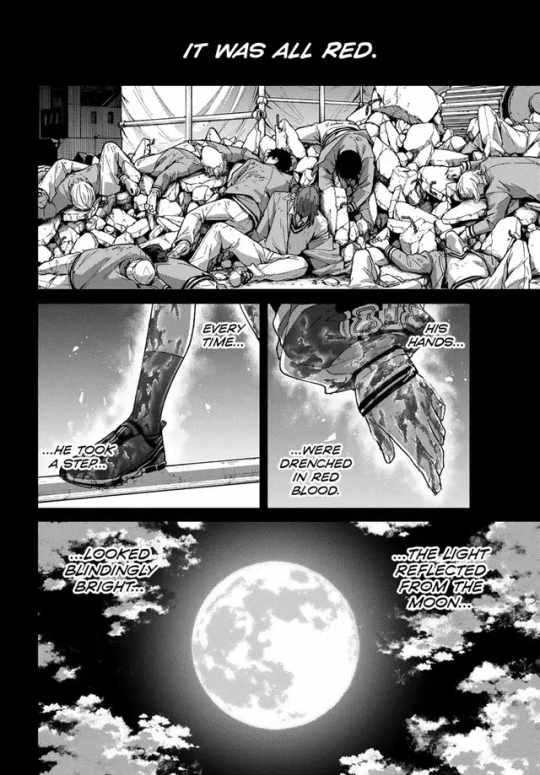

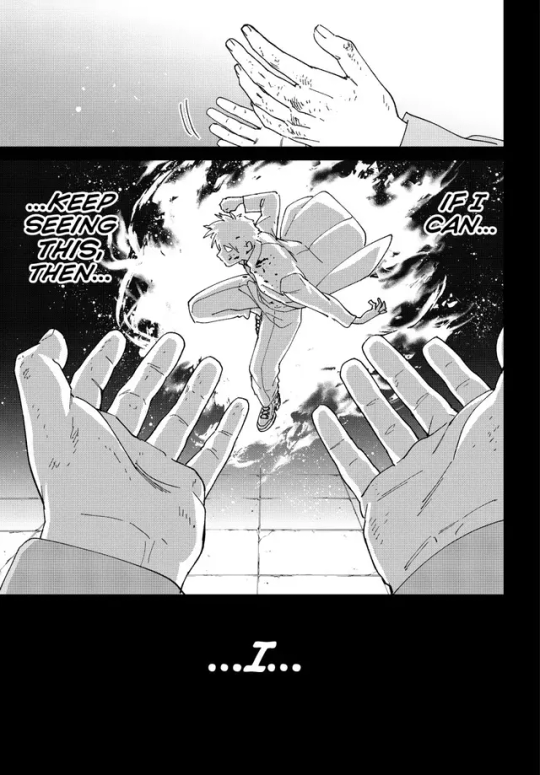

He’s also shown to set his (metaphorical) world ablaze as he walks through it in Chapter 153—which brings us to our next contender, Umemiya.
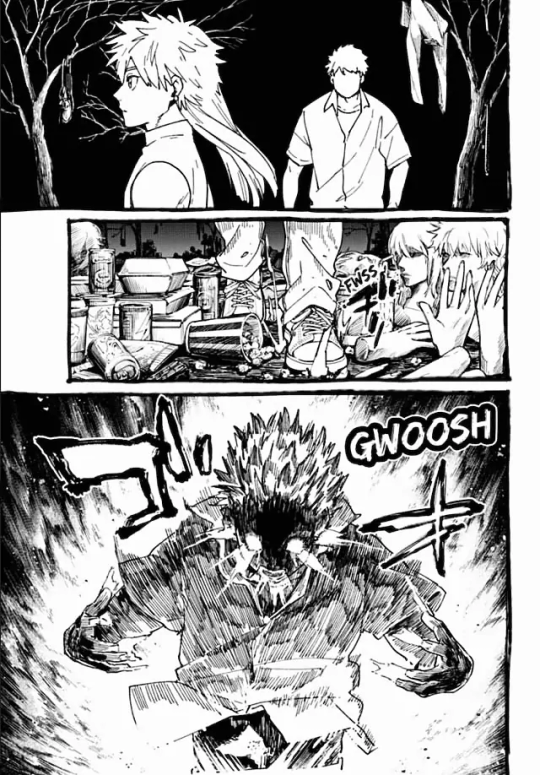
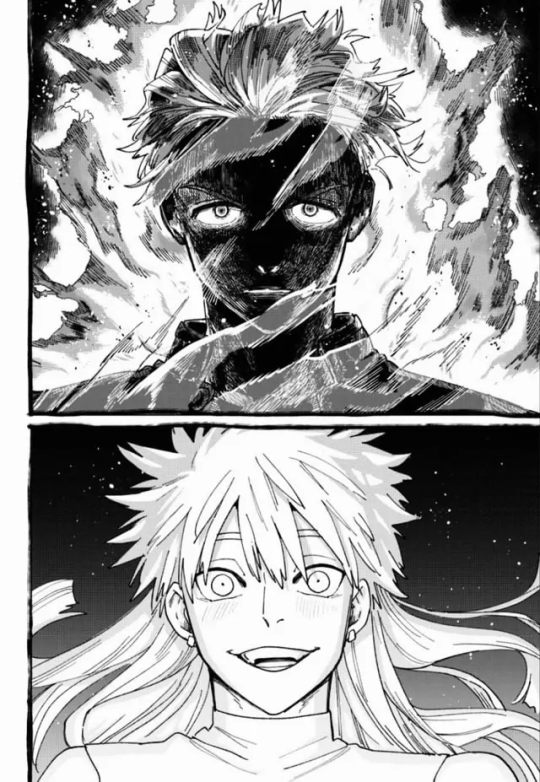
Umemiya is also associated with fire (though his flames are blue), which is quite ironic given that everyone Furin student follows the common theme of having a tree or plant in their name. After all, fire sets nature and foliage ablaze, destroying it in the process.
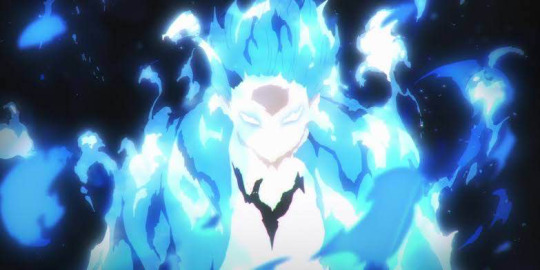


Endo also alludes to Ume being similar to a fire (ie. a source of heat). He especially highlights this fact during Noroshi’s final battle.


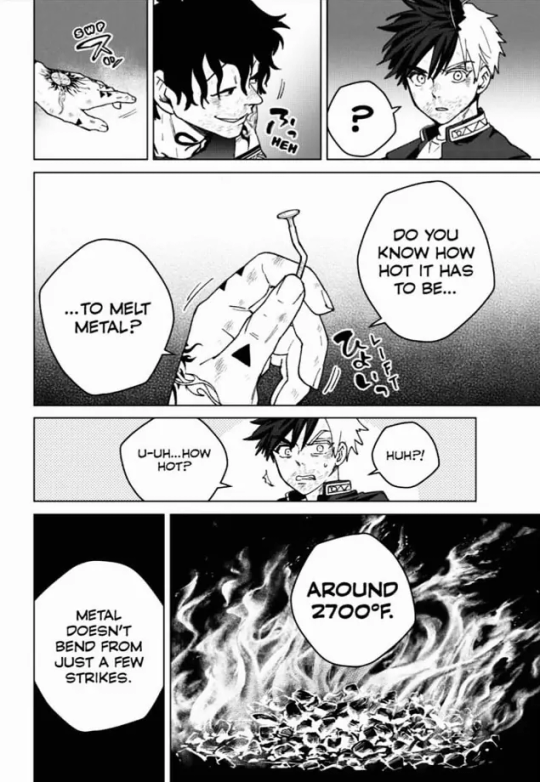
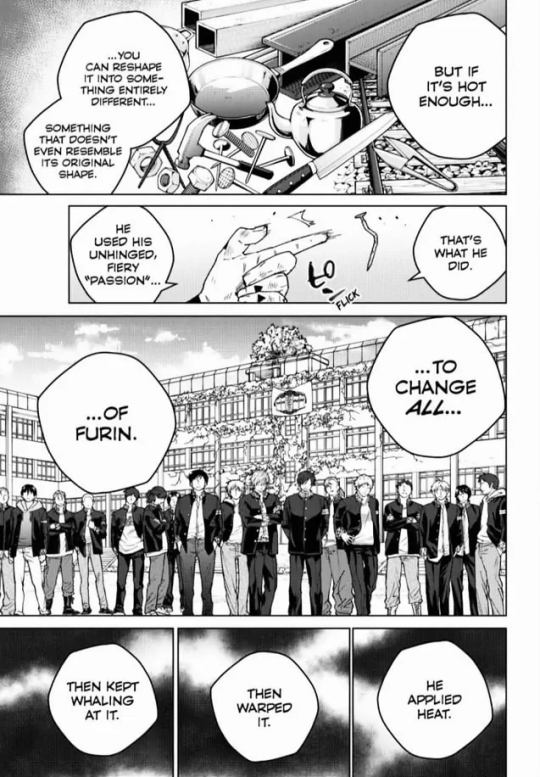
Although he isn’t exactly portrayed with flames around him, Endo does have a connection to fire. The 棪 character in 棪堂 (Endo) has the Japanese radical for fire (火) in it twice—after all, his character is staunchly connected to both Takiishi and Umemiya. He expresses the desire to burn Sakura down:
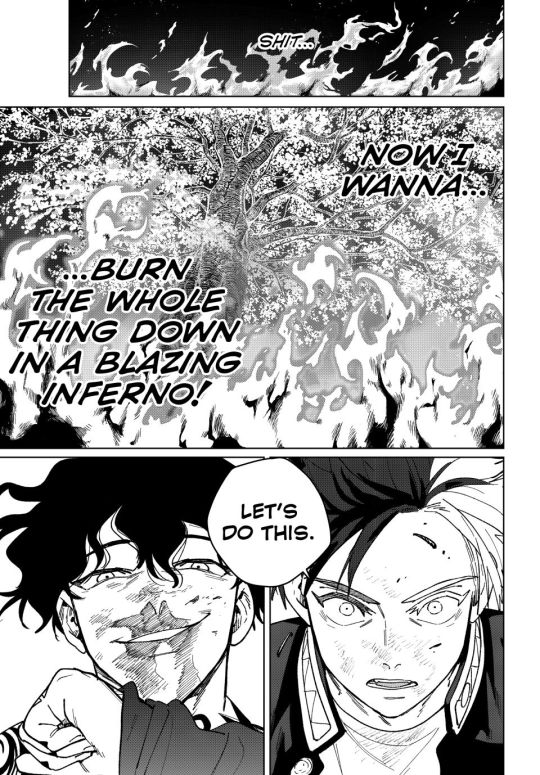
I’m also aware that Hiiragi is drawn with fire around him in his Bishamoten art but I couldn’t find a place to fit him in this post so this is just a footnote
As I’ve mentioned at the beginning, Sakura is portrayed with motifs related to water. The only exception is when he’s first shown to team up with Sugishita as both of them have flames rage in the backdrop. Perhaps fire (in a rather ironic sense) symbolizes an inherent connection to Bofurin and it’s students/allies.

Since fire is connected to Furin, Sakura being represented with motifs related to water merely solidifies his status as an outsider. Fire and water have always been considered opposites, both thematically and in the real world.
This theme is especially prevalent during the Noroshi arc. When Sakura discovers Tsubaki’s collapsed body and has his dead wife flashback likens it to Nirei in KEEL, we see a large volume water douse him in order to illustrate his shock.

In the next page we see Sakura begin to sink in a body of water, hinting at his slow mental decline during his fight with Endo. It also symbolizes how unsure and insecure he is, as Sakura thinks of his peers advice and thoughts.

Though, the thought of his community by itself manages to pull Sakura back up and focus on Endo again, but this moment foreshadows what is about to come of Sakura’s fight with Endo.
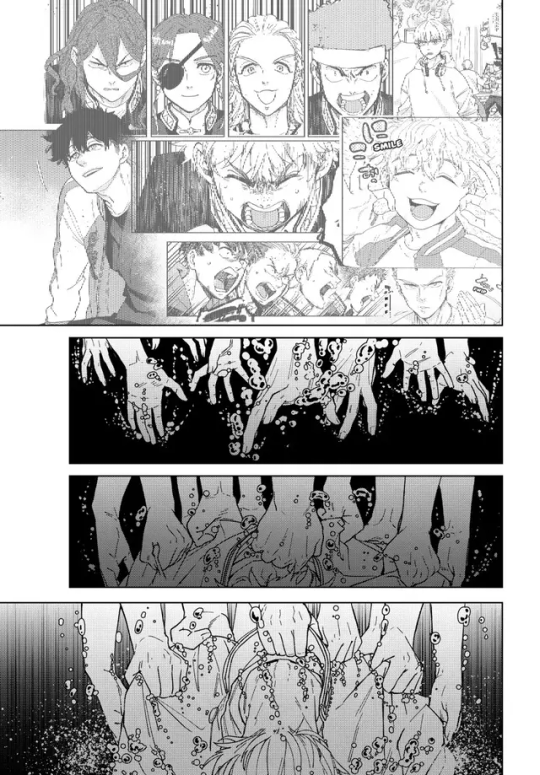
When Endo digs into Sakura’s insecurities, Sakura loses himself—and drowns as snakes (representing Endo) pull him even deeper into the water.
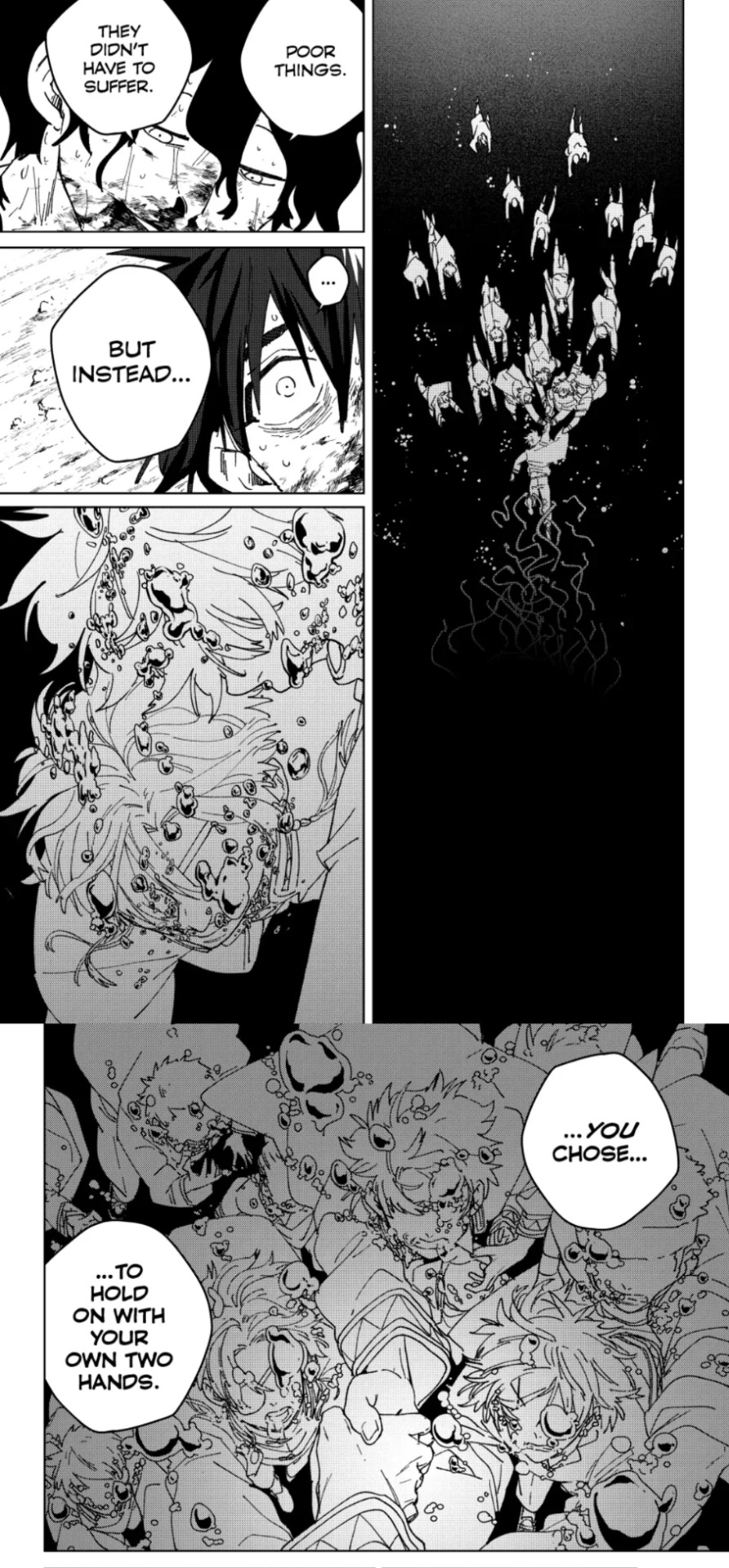
What makes this symbolism especially cruel is the fact that Sakura doesn’t know how to swim. He’s unable resurface on his own (both literally and in a metaphorical sense), having to rely on his peers to help him—though Endo makes it out to be Sakura dragging his friends down instead.

Sakura does eventually come back up and defeats Endo—and indirectly reaffirms Ume to win his fight with Chika. Additionally, Bofurin would’ve been in much more trouble if Sakura had never contact their allies to assist in the war. In a way, maybe water (Sakura) managed to douse the Great Fires of Extinction (Noroshi).

Sakura being the water to Umemiya/Endo/Chika/Furin’s fire also makes Hashirao’s connection of Sakura and that trio implausible and ironic.

This brings us back to Chapter 184, in which he doesn’t come in direct contact with the river of Makoichi. Instead, it reflects off of his face.

Throughout his conversation with Natsuki, he divulges his own feelings to her in order to put them on an equal emotional footing. He reflects on his past experiences (with an unreadable expression) in the process, many of which involved him grappling with similar emotions as Natsuki.
It’s important to note that Sakura and Natsuki converse near the bridge where the Noroshi vs Bofurin war had begun. Despite the battle being difficult for Sakura (as his and fears insecurities were brought to the forefront in the arc) and water having a general connotation to his negative emotions, Sakura is able to accept his fears and divulge them when needed.


Bonus: Sakura is able to differentiate the taste between certain types of water. He’s either sensitive to flavor, or he’s accustomed to noticing the differences in something as plain as water (I assume had to drink from various sources of water due to his neglect). Kid’s had it rough growing up

390 notes
·
View notes
Text
New reality part 3
The product designed by Philippe, meant to revolutionize physical performance, turned into a nightmare when it spread into the air as a red mist. This vapor radically transformed both Philippe and Director Duval, rewriting their reality: once a brilliant scientist and a respected businessman, they became arrogant gym rats, obsessed with their bodies, oozing testosterone, selfish, and sleeping with any man they came across.
In this new reality, Pierre — the former director — sold off the family pharmaceutical company to turn it into a massive fitness complex, a place dedicated to his training and new lifestyle. The lab itself was completely transformed into a gym, perfectly aligned with his new existence.

But the strange red mist didn’t just rewrite the lives of Philippe and Pierre. Once Pierre’s new identity took hold, the entire building was swallowed by the thick red fog. The facility slowly reshaped into a sports complex, altering the reality of everyone present inside. Among them were Bastien and Greg — two scientists caught in the middle of their workday.

When the mist seeped into their lab, Bastien and Greg barely had time to react. Within seconds, the air was filled with the strong scent of sweat.

The reaction was immediate: thick red smoke escaped from their mouths.
For Bastien, memories flooded back at high speed. He saw himself again in the modest apartment where he grew up, raised by loving parents who worked hard to give him a better future. Thanks to their sacrifices, he had left the tough neighborhood behind, made it into good schools, and eventually became a scientist at Duval Labs. He remembered his childhood friend — the one he had always secretly loved — whom he eventually married.
For Greg, the experience was just as brutal. He relived the bullying he endured every day at school for being gay. The mockery, the isolation, until one dark night when he tried to take his own life. His mother stopped him just in time. After they moved, he pursued his education in silence, hiding who he truly was. He graduated, joined Duval Labs, and kept his romantic life a secret.

The red smoke kept pouring from their mouths as memories continued to shift — some fading, others taking their place.
Bastien now saw himself growing up in a rough neighborhood, hanging around bad influences — the very people his parents tried so hard to keep him away from. Despite their efforts, he ended up admiring the older, tougher guys from the block. In his late teens, he eventually pulled away from that lifestyle and focused on his future. Boxing and bodybuilding helped him gain respect early on. He was still in a relationship with his childhood best friend, despite a complicated history between them.
Greg remembered the boy who bullied him relentlessly, calling him slurs. One day, in tears, he ran as far as he could. That moment felt like a release — like something inside him had been freed. Sports saved his life. Over time, he faced his abusers head-on and embraced being gay. Eventually, the bullying stopped, and people began to admire his impressive physique.
As these new memories rooted themselves, their bodies began to transform — swelling with muscle, growing more imposing by the second.

The red mist dug deeper, reshaping their past entirely.
Bastien now remembered trying to steal a car with some local thugs. His parents had failed to keep him away from trouble. He never finished school — too busy dealing and running the streets. He idolized the older guys with muscle and presence. Boxing and bodybuilding gave him that same powerful image. One day, he met Pierre Duval — a rich kid who offered him a boxing coach position at his new gym. It was the perfect opportunity: doing what he loved, well paid, in a space that matched his personality. Years of bad influences had hardened him — confident, but not someone you could easily trust. He never saw his childhood friend again; she had cut ties. When it came to relationships, he identified as bi — some of the guys he admired, he ended up sleeping with.
Greg’s past had twisted as well. He remembered that same bully, but now, he was the one who snapped. He flipped the script and became the aggressor. The other boy eventually attempted suicide. After that, Greg’s parents transferred him to another school. But Greg didn’t care — he swore he’d never be a victim again. He embraced who he was, built up his body, and earned the admiration of his peers. Years later, he ran into his old bully and learned the truth: the kid was gay too. They began seeing each other and eventually became a free couple. Greg was truly happy.
He got a job as a coach in the newly transformed sports complex — a revolutionary gym where he could meet new guys, have fun, and enjoy life with his partner’s full support.
As their new memories fully took hold, overwriting the past, their physical transformation intensified. Their features sharpened, their bodies bulked up, and their posture became naturally confident — almost cocky.

Their new reality took over completely, erasing all traces of their former lives. The red mist slowly faded, revealing a fully redesigned space: the lab had become a cutting-edge gym. Bastien and Greg were now ready to coach any man striving for the perfect body — and explore pleasures far beyond training.

The red mist had changed everyone present that day. Philippe would never know, but he had triggered it all.
And though the red cloud has vanished from sight, it hasn’t truly disappeared.
It found another way to fulfill its purpose. Quietly. Elsewhere.

245 notes
·
View notes
Note
I don't get what you mean about Western anti-Israel sentiment seeming empty. The two people I know who are most anti-Israel are Israeli citizens, both served in the IDF. Neither live in Israel any more. One left voluntarily, the other was forced to leave after he was fired from his university job in response to criticism of what the IDF was doing in Gaza recently. He now lives in the UK.
The next most intense criticism of Israel I hear are from people like me with friends and/or family who have also served in the IDF, or other close ties, such my friend who became more radically anti-Israel after his rabbi heard from someone he knew personally, who was forced into hiding after people started threatening his family, in response to him publicly criticizing the IDF for actions in Gaza.
I don't know a single person who is anti-Israel, who does not have at least one close connection to such a person, so at most two degrees of separation to people with direct experience over there, including voting, serving in the IDF, and potentially being vulnerable to antisemitic terrorism in daily life.
Maybe there are such people out there, but I do not come into contact with them in real life. And when I see a bad take online, I don't know that they're real, and not just planted there to discredit a particular perspective.
To me, it almost seems like these takes that depict criticism of Israel as shallow or out-of-touch are attempts by the hardliners who support Netanyahu's authoritarian regime, to deflect criticism and paint all such criticism as antisemitism. They are attempts to enforce an orthodoxy. They are part of the same trend of censorship and enforced silence, why people like us are all unwelcome at Hillel. Why Hillel is barred from even co-sponsoring events with student organizations that have, at one point or another, criticized Israel.
So yeah, that's my perspective. Take it with a grain of salt. I'm not even Jewish, I know, since it's my dad's side of the family that my Jewish heritage is from. But your post reached me, and your characterization of Western criticism of Israel struck me as very off-base given my life experiences. And I wanted to challenge that.
If you've read this far, thank you for your time.
No, thank you for yours, Anon.
Thank you for this thoughtful, civil pushback which is clearly from real lived experience of someone who cares about the topic. I'm grateful that you took the time to share your perspective.
I think you're making six points here, and I want to address each one.
I also need to note that I'm not Israeli. I'm an interested American. I do not and cannot speak for a single Israeli.
I would love for Israelis to reply here and share any thoughts they have.
1. The most anti-Israel people I know are Israelis who served in the IDF.
That may well be true for your circle, but it's a mistake to extrapolate from that into a general rule. The overwhelming majority of Jewish Israelis are Zionists, meaning they believe Israel should exist as a Jewish and democratic state. That's not an opinion, there's evidence:
In a Pew survey, 91% of Jewish Israelis said they believe in the continued existence of Israel as a Jewish state. Among those who disapprove of the current government, only a tiny minority support international delegitimization efforts like BDS.
Israelis are often critical of their government - sometimes brutally so. That’s democracy, and Israel's democracy is pretty polarized right now on a number of matters, but broad (and valid, imho) criticism of Netanyahu’s policies is not the same thing as opposing the country's right to exist.
It's precisely because Israelis have lived through wars, terror attacks, and compulsory military service that most of them are committed to Israel's survival and are not interested in dismantling it.
Regarding the IDF, the 2023 Israeli Democracy Index from the Israel Democracy Institute shows that Jewish Israelis trust the IDF more than any other government institution, at about 86%.
For contrast, only about 60% of Americans trust the US military.

Even in late 2023, please note, faith in Bibi and his government was pretty bad. It's gotten worse since. The most recent poll from Pew shows about 54% unfavorable views of Netanyahu and the Israeli political observers who I read believe public opinion on Bibi is far worse than this data shows. (Personally, I have loathed him with increasing intensity for about 20 years.)
So yes, you may know two dissidents. But the data (or talking with Israelis) will demonstrate they're the exception, not the rule.
(This is what's called an Anecdotal Fallacy. You have two self-selected data points, not a data set.)
2. Everyone I know with anti-Israel views has close personal ties to Israel or Jews.
This might be true in your social universe, but again, it doesn’t scale.
On social media and campus protests, many of the loudest voices have zero firsthand knowledge of Israel, no connections to Jewish life, and often can't find Gaza on a map. They’re not debating policy; they’re chanting slogans and treating Israel as a symbolic villain in a Western morality play. But it'd be fair to tell me that's an anecdotal fallacy too- so let's look at polling data.
A 2021 Pew study found that only 27% of Americans under 30 know someone who is Jewish - and that 27% includes American Jews.
American Jews overwhelmingly support the continued existence of Israel while simultaneously being consistently critical of its government.
(At the same time, most Jews worldwide remain flabbergasted that only one nation on earth routinely has the legitimacy of its existence - it's right to exist - questioned.)
Pew indicates that only about 1 in 10 American Jews support BDS.
So when you say you don't know a single anti-Israel person without strong ties to Jews or Israelis, I believe you - but that would make your circle a statistical aberration, not the norm.
This logical fallacy is called an Argument from Ignorance.
Just because you personally haven't met shallow, performative critics doesn't mean they don't exist, right? It just means you haven’t encountered them.
That's like someone in Maine saying, "I don’t believe in cacti because I’ve never seen one myself, ayup."
Meanwhile, the rest of us are watching protests full of people with no connection to Israel, chanting about "global intifada," while livestreaming from their iPhones. They’re not drawing from deep experience - they’re mimicking a subculture.
Here's one of the ways we know that:
Western "pro-palestine" demonstrators largely seem to believe that "intifada" means "uprising" and that "globalize the intifada" merely calls for global political protesting.
Israelis and Jews, on the other hand, hear that as a call for violence against Jews everywhere, and with good reason.
The Second Intifada (2000 - 2005) was quite violent, and included (but was not limited to) about 145 suicide bombings which killed more than 11,000 Israelis. Because these attacks targeted civilians, 78% of these deaths were civilians. "Globalizing the intifada," to Jews, is what happened to a young couple leaving the Jewish museum in DC when a man shouting "Free Palestine" emptied his gun into them. Jews feel that when 12 Jews who were marching (not for Israel but) for awareness of the hostages in Gaza were attacked with Molotov cocktails in Boulder on Sunday. One of them was a holocaust survivor. Two are still in the hospital.
To Jews, this is globalizing the intifada. It's people who claim to be antizionist-not-antisemitic...attacking Jews in the name of "freeing Palestine."
Yes, there are people with deep connections who criticize Israel, but they're not the ones shaping the dominant online narrative. Most of that comes from activists with no firsthand knowledge - just hashtags, vibes, and a deeply edited version of history. Their lack of knowledge is immediately clear to anyone who has been following this conflict, as all Israelis and most US Jews have been doing for decades.
But don't take my word for it about their ignorance and motives. Ask Gazans Hamza Howidy and Ahmed Fouad Alkhatib, neither of whom are fans of Israel.
3. Bad takes online might not be real; they could be planted to discredit critics.
This is an understandable emotional reaction in today's information chaos - but it is awfully problematic.
When confronted with bad arguments on your side, instead of addressing them, you're saying: maybe they're fake.
That’s not engaging with evidence - that’s sidestepping it. It's a way to protect your belief by treating contrary examples as inauthentic.
It’s an epistemic trap: if every bad take is fake, and every criticism of your views is a psy-op, then no disagreement is ever legitimate.
Accusing them of being plants is a bit like plugging your ears and yelling "propaganda!" (Which, by the way, I see a lot of.)
If you want to reject bad arguments, engage them - but dismissing them as false flags just shuts the door on things like dialogue, evidence, and intellectual honesty.
Even if some trolls exist to make the anti-Israel side look bad (and I think they do exist because I've seen people clumsily and transparently pretend to be Jews in just that way), that wouldn't mean all or even a significant number of bad takes are planted.
Some people just don’t know what they’re talking about. When a cause gains cultural currency - as antizionism has - plenty of people will jump on board for identity reasons, aesthetic reasons, or social validation. That's not a psy-op. That's human behavior. That's most of what I've been writing about.
If you'd like to see videos of anti-Israel protestors demonstrating their utter ignorance (like not knowing what river and what sea or not being able to find Gaza on a map), there's quite a lot of that online.
youtube
youtube
4. Your post struck me as an attempt to enforce orthodoxy and deflect criticism.
I think I can maybe understand why. Some defenders of Israel absolutely do conflate all criticism of Israel with antisemitism - and that’s neither helpful nor honest. Fuck that.
I think fact-based criticisms of Israel which hold Israel to the same standards as other nations and don't play on antisemitic tropes are not just valid, but necessary.
My concern wasn't with criticism - it was with a specific genre of shallow, selective, performative, uninformed criticism that circulates online, mostly divorced from any actual knowledge of the region.
You’ve probably seen the people I’m talking about: They can’t pronounce "Yitzhak," they confuse the IDF with Shin Bet, and genuinely believe British Mandate Palestine was a utopia of pluralism until 1948. They’re not arguing for Palestinian liberation so much as LARPing as revolutionaries, casting themselves in a resistance cosplay.
Also, by preemptively framing critiques of your position as "enforcing orthodoxy," you're setting up a rhetorical trap in which anyone who disagrees with you can be dismissed as part of the authoritarian thought police.
But disagreement is not censorship and criticism is not suppression.
Questioning anti-Zionism - especially when it veers into demonization, double standards, or delegitimization - isn't an attempt to enforce orthodoxy. It's an attempt to draw distinctions between genuine moral concern and something much more toxic.
I hope you'll respond and let me know specifically where you think I did that - and I hope you'll feel that right now, I'm engaging with the substance of your criticisms - and not misrepresenting you, silencing you, or censoring you.
5. Hillel bans co-sponsoring events with anti-Israel student groups. That’s censorship and proves hardline control.
Your wording:
...Hillel is barred from even co-sponsoring events with student organizations that have, at one point or another, criticized Israel.
I'm certain that someone told you that and you're repeating it as you understood it, but that's false.
Hillel International's standards prohibit co-sponsorship with groups that deny Israel’s right to exist, call for boycotts, or associate with antisemitic rhetoric - not merely "groups that criticize Israel."
Saying "Netanyahu is awful" is criticism (a very common one among Jews).
Saying "Israel is a settler-colonial apartheid state that must be dismantled" is a political eliminationist position. Those are not the same, and to pretend they are would be dishonest.
Would you expect Black Lives Matter to co-host an event with an organization called "University White Pride" which describes the Civil Rights Movement as a disaster?
Imagine a group called "Friends of Turkey" which favors the abolition of the nation of Greece demands to co-sponsor an event with the Greek Student Association. Would you require the Greek Student Association to work with them?
6. I’m not Jewish - I only have Jewish heritage through my dad.
That doesn’t disqualify you from caring, from engaging, or from feeling a connection.
Jewish identity is complex, and belonging is about more than halakhic status.
I'm glad my post reached you, I'm glad you read it, and I'm glad you wrote.
I want conversations. I want to reach across some difficult lines with integrity, honesty, and sincerity - and I really hope you can feel that.
Final thought:
You read my post as a blanket dismissal of all Western criticism of Israel. That wasn’t my intention and I don't think the post says that.
What I was criticizing is the growing genre of Western anti-Israel performance that often relies on ignorance, moral absolutism, and aesthetic radicalism instead of real knowledge or constructive goals.
I dislike it because it flattens complexity, ignores context, and turns one of the most nuanced and complex conflicts on Earth into a cartoon of oppressor vs. oppressed...which is demeaning to both Israelis and Palestinians.
You, clearly, are not part of that crowd, and your Ask is proof of that.
So again: thank you for your civility, your honesty, and your perspective. We may not agree, but if more people engaged with disagreement the way you did, the discourse would be a lot less toxic and a lot more meaningful.
We can do better, and your Ask proves it.
Thanks again for reading and for writing - please do so again any time!
184 notes
·
View notes
Text
State of the Severance fandom rn:
Fans: “Where is Gemma” 😡
Creators: “We hoped you guys would care but we honestly didn’t expect y’all to care this much (we aren’t changing our story lol)”
Dichen Lachman: “I always had a feeling that he would choose Helly, and Mark and Gemma wouldn’t end up together. Relationships are always more perfect on the outside than the inside. We had to make the past look good.”
Ben Stiller: “Outie Mark is condescending, selfish and guilty. We’ve followed Innie Mark and Helly’s story longer.” (He spilled with that.)
Adam Scott: “Mark and Helly are madly in love and if the stars align they’ll meet outside and reintegrate. Falling love was the most radical act of freedom they allowed themselves to experience.”
Dan Erickson: “Helly is like his wife. Mark is essentially choosing between two lives, two wives, two identities. But at the end of the day, although he may feel sympathy for Gemma / Ms. Casey, the woman he loves is standing behind him. Also real love does transcend.”
Britt Lower: “I have microbangs.” :)

#severance#mark scout#mark s#severance apple tv#markhelly#markhellyna#helly r#markhelena#helly riggs#severance season 2#severance finale#severance posting#sevposting#severanceposting#Dan Erickson#ben stiller#adam scott#Britt lower#Dichen lachman#apple tv
198 notes
·
View notes
Text
FML: Sealed
The plan was simple, if time consuming. Rent some apartments out, and wait. Of course, there were some preparation required. First, buy an old apartment building, something not too expensive and not too flashy. Make some small changes to the central air system and temperature control. Bring the whole thing up to code and install a beautiful, in building gym. Hire a team of savvy young women to help manage the apartments. Then, carefully and selectively rent out the one bed, one bath apartments to single, young men who showed promise. Some were just graduated 20-somethings, with a bright future ahead in STEM careers. Some were trust fund kids moving to the city for the first time, drawn to the quickly gentrifying downtown. Some were just personal pet projects that I wanted to see grow into their potential. Like this fellow:
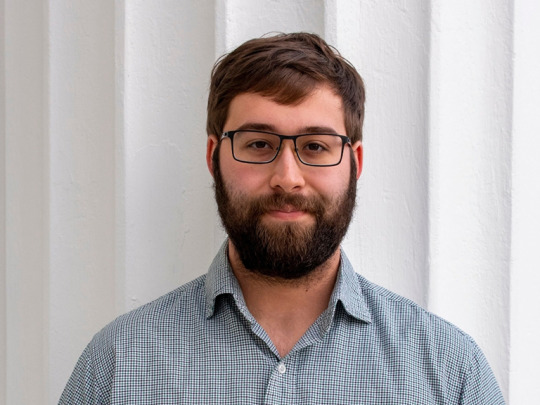
I wanted to see what would happen on a bit more of a bear-ish body type. We set him up in Unit 514. Or this bro:

He was already pretty close to what we wanted our final results to look like. But I wanted to see how much we could push him. Unit 112, low and close to the gym. Good eye candy for some of the twinks we set up on the sixth floor. After about 3 months, every unit in the building had been filled, all eight floors. It was the first of June, around 4 a.m. when we had verified all residents were home. The overnight receptionist was sent home early for the day as upstairs, all door locks were remotely engaged, power was cut, and the new air conditioners kicked in. All subjects were sealed in their experiment chambers.
Slowly but surely, a thick fog billowed from each bedroom’s vents. It was a thick, sticky vapor, smelling like sandalwood and cool like peppermint. Subjects’ rooms were soon filled as they began breathing it in deeply. Some began to toss in their sleep, subconsciously fighting the mist, while others just huffed away and began the absorption process. One fellow on the second floor managed to toss himself awake, but was quickly sedated by an extra pump of vaporized melatonin added to his room.
As the men all settled down and opened up, the mist began absorbing into their bodies through any gap available: mouth, nose, pores, cocks, and asses. Within thirty minutes, the last of the gas has been administered, and all subjects were once more peacefully at rest. Bodies began twitching and pulsing as faint moans emitted from some of the smaller men’s mouths. The experiment had began.
The first to wake up in the morning was a subject in apartment 211. His transformation was among the more subtle. The lanky guy had put on a few pounds of muscle as his beard thickened and some hair grew in. He immediately began to sense something was off, as he felt his body and now bushy beard. He tried to check his phone. Dead. He gets up and tries to walk out into the apartment. Locked. A look of confusion sets in as he sits and tries to think of what to try next. That is when it catches him. With the power out and the sun rising, temperatures were rising. And as he began to sweat, he began to smell:
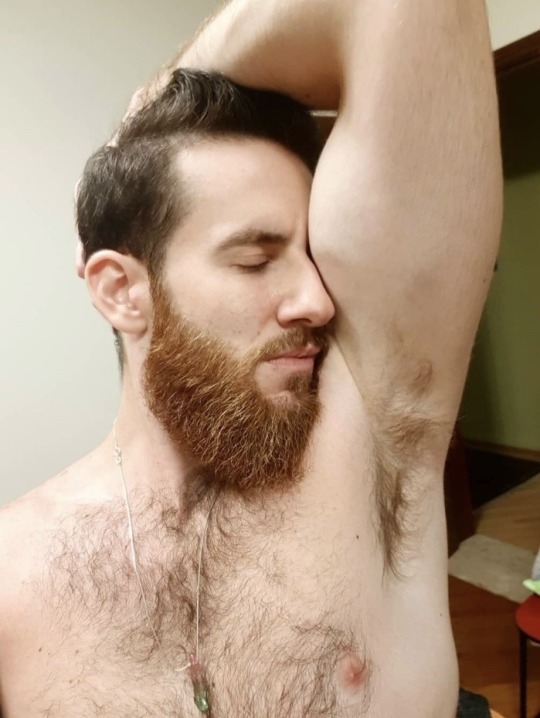
The gasses that seeped in last night were slowly beginning to seep back out, causing more radical changes. But this second exposure is different. It is coming from inside him, and carries his unique pheromones with it. This gas is heroin to him, designed to addict his body to its presence and slowly bring out the best in him. And as the smell fills his nostrils for a second time, he is fighting the urge to give in. Give into himself and what he is becoming. He knows that the smell is rancid, musky and earthy with notes of spice that burn his nostrils. But it is a lost cause. As he huffs away at his own funk, he glides his free hand down his chest, feeling thick, matted hair and slick abs. He takes a moment to feel his muscles twitching and stretching as his skin becomes sensitive to the touch. He wraps his sweaty, calloused hand around his cock, and begins to pump.
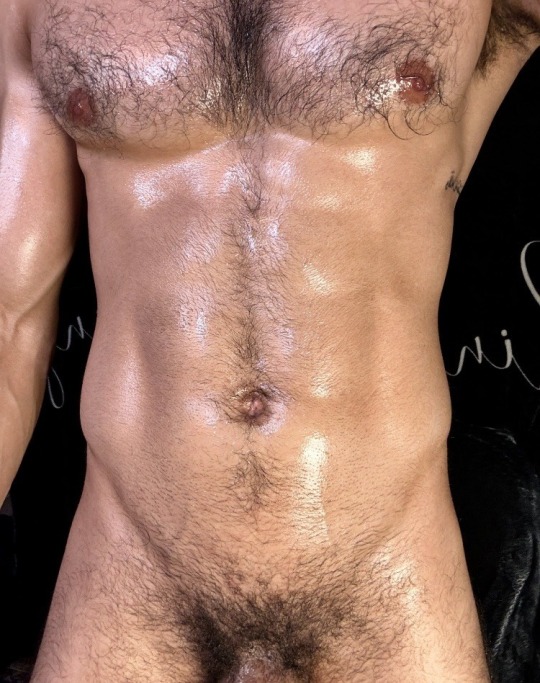
Once he begins to pleasure himself, there is very minimal risk of a reversal. The changes are rapid and extensive his body grows to match the smell that now saturates the air around him. Muscles swell, bones crack and reshape, feet stretch, and his eyes roll in the back of his head as he starts to drool. The fog settling into his brain leaves no room for inhibitions as he starts to self worships his pit, devouring his own sweat. Our scanners also begin to detect deterioration in brain activity. The pleasure center is growing, eating into non-essential regions like memory and comprehension. No part of the original subject is left unchanged as he continues to evolve into a sweaty, smelly, hairy beast of a man. And as he reaches climax, he lets out a deep roar as all inhibitions about his new form are shot out the swollen mushroom tip of his cock. He rolls his foreskin back up and shoves his filthy cock into a pair of sweatpants.
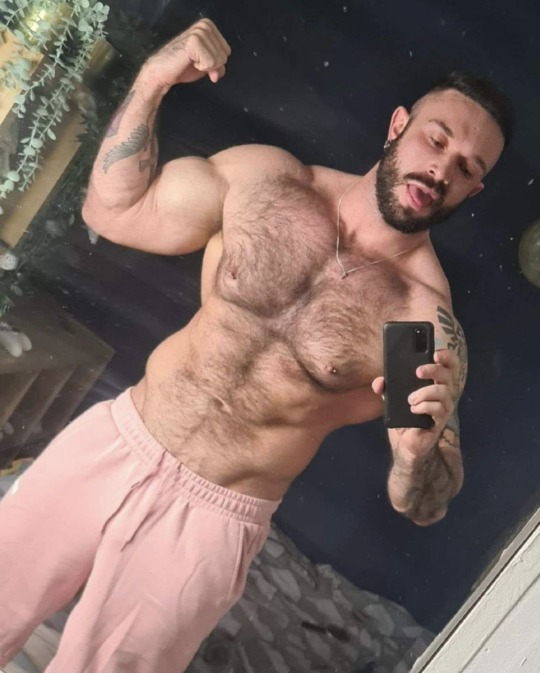
He stares at his body, flexing and feeling up his muscles. Experiment 211 has been a success, able to turn a scrawny nerd into a horny, sweaty, smelly gym bro with an insatiable need to fuck. Now we just need to test how powerful his sperm and scent are. He hears a click as his chamber is unlocked. We pulse the lights in the room with a code his mind will understand. He now knows his mission is to go over to Apartment 212 and begin round two of testing…
It is a bit later in the morning now and subjects all around are beginning to wake up and face their new reality. Through our camera network we watch as their transformations are slowly taking place, as muscle, fat, and fur are packed on and a cloud of musk begins to cloud the room.
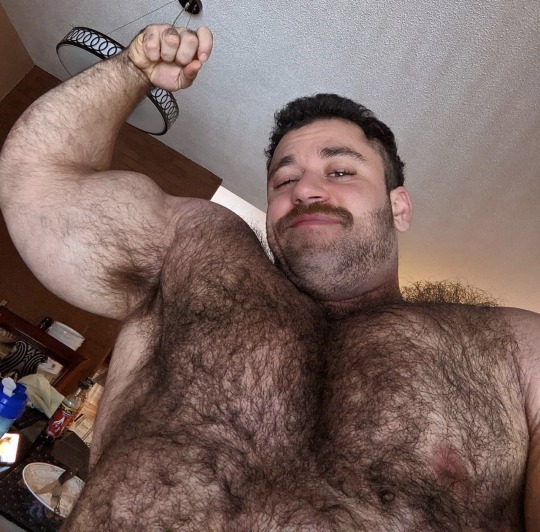

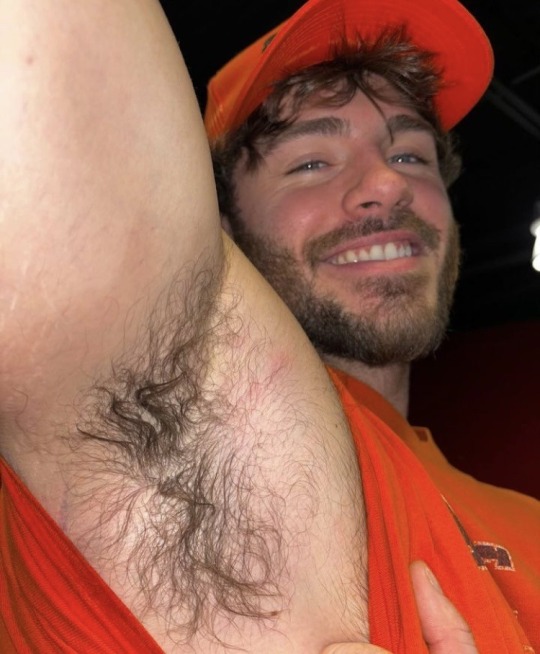
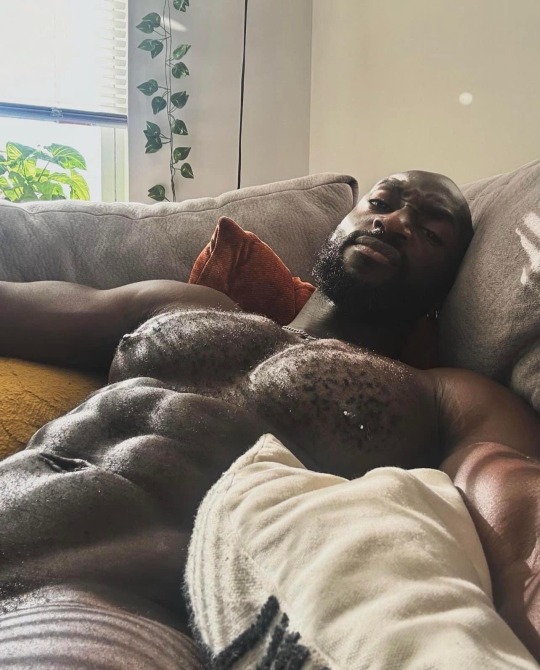
And slowly as men finish their first rounds, their chambers are unsealed. They begin to wander and find their neighbors, mixing musks to help each other grow and change even more.
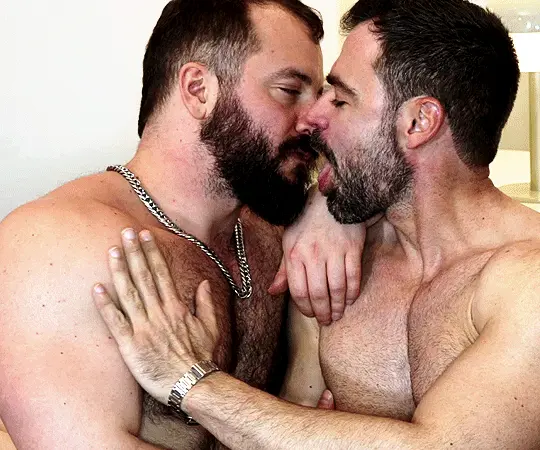
The experiment will run sealed off from the general public, at least until new subjects are needed to collect additional data points. Interested parties are encouraged to apply now to our waitlist. Otherwise, we expect to host an open house next month, with all subjects free to leave the complex and continue experimenting as they see fit. I can already tell that our friend we started with in Unit 514 will be popular.
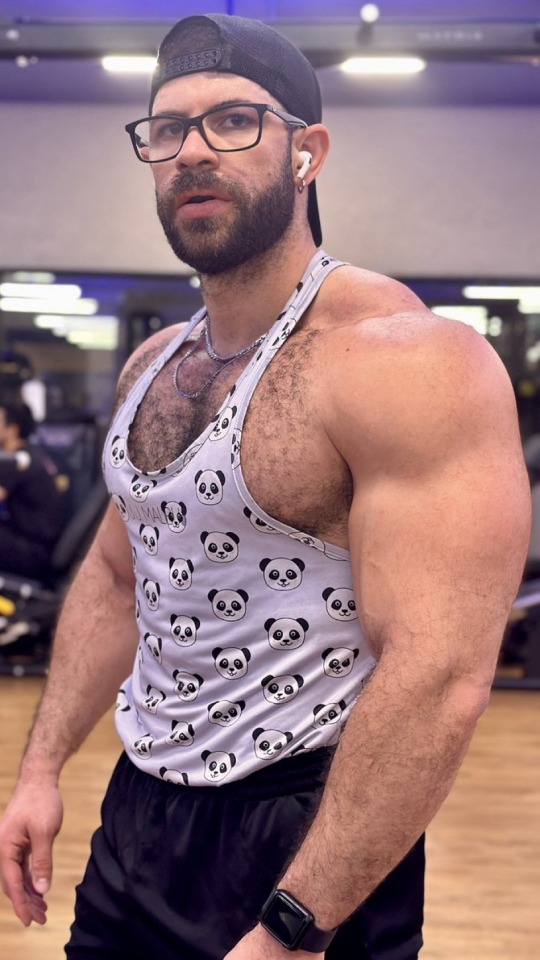
Thank you for your time today. We expect to see you again very soon.
#male transformation#musk#straight to gay#jockification#reality change#jock#fml#mass tf#transformation
787 notes
·
View notes
Note
Thank you for talking about how Viktor wouldn't be mean to Jayce! I do really agree that fandom really tries to boil them down to their basics or preexisting tropes and it really sucks to see people think he'd really insult Jayce or hit him with his cane. Something I started thinking about after I read that post is that so much of the cast are Zaunite and nearly every one of them are sharp-tongued, and so maybe that's why people think Viktor would be mean? But that doesn't really take into account his personality or how he might feel he has to present himself as someone from Zaun living in Piltover.
Yeah the "hitting with the cane" trope definitely feels OOC for him to me. I could maybe see him tapping or hooking Jayce to get his attention but... even then. We rarely see Viktor use his cane or crutch for anything but their intended purpose.
If I may extrapolate out, I find it notable that when he has the cane pre-time skip he leaves it aside when possible, like when standing at the blackboard, and tries to mask his disability. I know for many people with disabilities, they love their aids, and the aids given them freedom of movement and from pain, but I would venture to say that Viktor does not see his crutch or his cane all that favorably.
I think Viktor sees his disability aids as necessary indignities that he'd rather do without if he could. See how quickly he drops his crutch once he tests out being able to run post-experimentation. He probably only goes back and gets it, rather than abandoning it there, because he wants to continue to hide the experiments he's doing.
Combine that with Jayce noting how he saw his leg as a "weakness" and I think there is further evidence that Viktor sees his crutch or cane rather negatively.
Which is a roundabout way of saying, I don't think Viktor would use his crutch or his cane as a hook or a bludgeon against Jayce not only because he's arguably the most pacifistic character in the whole show, but also because I don't think he really likes using it or thinking about it for anything but its intended purpose of assisting his mobility. I think Jayce views Viktor's crutch more favorably than Viktor does, he sees it as a part of Viktor in a positive way, an extension of him.
As for the topic of Zaun, I do agree that I think some fics give Viktor more of a, hmm, "class consciousness" around Zaun than he's shown to have?
For example:
Viktor only ever calls it "the undercity" in S1. Calling it Zaun at all is something that radicals like Silco do, it's even implied that Silco is kind of resurrecting a long-dead name for the area as part of his separatist movement, so it might not even be in wide use beyond Silco's circles, like Viktor may not have even really heard of it as a common term in S1. In addition, if "Zaun" is a politically charged term, I wouldn't be surprised if Viktor would avoid calling it that at all, because he's not a separatist or a radical, he's just from there and he thinks of it as "the undercity". Viktor is not shown as someone from the undercity who really wants to rock the boat in Piltover politically and he's certainly not a separatist, he wants to help the undercity as a disadvantaged community within Piltover.
The only time I think we see Viktor call it "Zaun" is somewhat in the abstract in S2, when he admires Vander's vision for "Zaun as it could have been". To me, it felt like he was discussing Zaun as a distant ideal rather than as the place where he was currently located or a political identity he identified with. He admires that other people who are more political than him had a cohesive vision for something the undercity that Viktor knows could become.
Viktor is actually incredibly apolitical, which is interesting when you consider he was assistant to Heimerdinger, who was head of the Council. He considers Jayce's time as a Councilor a "waste of our time", it never even occurs to him to use that political power to improve lives in the undercity, instead of science. In general Viktor tends to be pretty blind to other discipline besides science when it comes to bettering the world, and is even dismissive of them, which I think is a bit narrow-minded of him to be honest.
Viktor's dismissiveness towards anything that isn't science when it comes to improving lives is certainly a factor in how his and Jayce's relationship becomes strained in S1, he never sees Jayce's work as a Councilor as potentially offering a broader avenue for achieving their goals to help the undercity, not once, which is actually rather baffling and interesting that he has this blindspot (possibly because of my theory that at a certain point in S1, once he knows he's rapidly dying, Viktor is only using "helping the undercity" as a smokescreen to others but mostly himself to cover up his shame for the fact he really just wants to use Hextech to save himself while the undercity has become secondary, but he doesn't want to admit that. That also explains his shame when he sees Sky's notes and realizes he's been trying to save himself to the exclusion of all else, that he's lost sight of his larger goals and dreams.)
Even when Viktor starts the cult in the undercity, it's not a politically motivated enclave, he doesn't describe it as part of a Zaunite movement. It really is just posed as a refuge for those in need, separate entirely I would argue from the Piltover vs. Zaun conflict, unlike Ekko's Firelights who provide shelter AND do community action and freedom fighting. Indeed, Viktor heals Salo, a Councilor, the most privileged of the privileged from Piltover. I'd argue this is an additional sign that he is "colorblind" when it comes to the conflict between the two cities.
Finally, I would argue that Viktor is from a generation that somewhat precedes the class conflicts and brewing civil war between Piltover and the undercity. I think he's from a generation where the cities were still linked enough that they were more like the "good" and the "bad" side of the tracks. He was smart enough to get out and make something of himself in the big city, he has a goal of helping to uplift those he left behind, but he sees them as one city still even if he has sympathy later for a separatist movement. The way he talks about the undercity to me feels less like a separate entity and more a particular disadvantaged community within Piltover.
Anyway, I've gone off on like three crazy wild tangents based on your reply. Thank you so much! I'm glad you enjoyed that post! And I agree, of all the Zaunites, Viktor is actually quite different from the others and that is really interesting to explore!
335 notes
·
View notes
Text
This kind of Denethor discourse is so frustrating to me that I am literally pacing back and forth like a panther in a zoo enclosure. Ugggggggghhhhh
A lot of people will tell you that the moral of The Lord of the Rings is “never lose hope,” and that Denethor is bad because he loses hope.
Please read THIS and THIS and especially THIS, which is one of the most beautiful and heartbreaking meditations on LotR you’ll ever read. Tolkien’s ideas about hope are so much more radical than “hope good despair bad.”
Denethor—Tolkien’s Denethor, not Peter Jackson’s Denethor—is unsettling because he tries to hope, but his hope isn’t strong enough to save him. Here are his thoughts on hope, just a few days before his death:
The time will not be long. In what is left, let all who fight the Enemy in their fashion be at one, and keep hope while they may, and after hope still the hardihood to die free.
Denethor has a more “realist” worldview than Gandalf or Faramir, but he’s not a nihilist. He’s still hanging onto hope even though he’s grieving Boromir and he’s positive that Frodo is going to be captured by Sauron. He only breaks when Faramir is mortally wounded and he sees the black ships in the palantir. And I don’t mean he gives up, I mean his mind snaps:
And as [Pippin] watched, it seemed to him that Denethor grew old before his eyes, as if something had snapped in his proud will, and his stern mind was overthrown.
Tolkien repeatedly uses language like “madness,” “madman,” “he is not himself” and “his mind was overthrown.” It’s not subtle!
Denethor is having a psychotic episode. His culpability is reduced, either partially or totally; we can’t know for certain. But I don’t think that everything he says and does in his last moments is “the real Denethor.”
We can do our best and try to have hope, but sometimes life crushes us. How are we supposed to live with the knowledge that this can happen?
Tolkien was haunted by the idea of heroes who fail, heroes who are crushed by their burdens:
Frodo indeed 'failed' as a hero, as conceived by simple minds: he did not endure to the end; he gave in, ratted. (Letter 246)
….I think it can be observed in history and experience that some individuals seem to be placed in 'sacrificial' positions: situations or tasks that for perfection of solution demand powers beyond their utmost limits, even beyond all possible limits for an incarnate creature in a physical world – in which a body may be destroyed, or so maimed that it affects the mind and will. Judgement upon any such case should then depend on the motives and disposition with which he started out, and should weigh his actions against the utmost possibility of his powers, all along the road to whatever proved the breaking-point. (Letter 246)
Tolkien himself tended to judge Denethor harshly, but the character fits very well into the same template as Frodo: a “sacrificial” person who is pushed beyond his limits. The palantir aged him and weakened his mental health, but what truly pushed him over the edge was the wounding of Faramir: Tolkien says that Denethor “maintained the integrity of his personality until the final blow of the (apparently) mortal wound of his only surviving son.”
It’s easy to judge Denethor for using the palantir (although Tolkien said that he had the right to use it and Gandalf admitted that the palantir’s knowledge had often proved useful!) but what should Denethor have done differently regarding sending Faramir into battle? We know that the defense of Osgiliath was necessary because Tolkien had the Rohirrim arrive at the exact moment the Witch King is about to ride through the gate of Minas Tirith. If Faramir hadn’t delayed Mordor’s army, the Rohirrim would have showed up to a conquered city.
Denethor believed that it was necessary to send Faramir to Osgiliath… and he was right! But the pain of being responsible for Faramir’s death was too great for him to bear. You can say that his craving for information killed him, but it’s just as accurate to say that his love for Faramir killed him.
Gandalf tells Denethor’s servants that they were “caught in a net of warring duties,” and this is also true of Denethor. His duty as a father conflicts with his duty as the leader of Gondor, and the strain destroys him.
It may be true that Denethor’s need for control is a character flaw, but I wonder about his final use of the palantir. His son appears to be dying: why does he leave his side to go look in the palantir? I actually think this was a hopeful act: Denethor was hoping to see the Rohirrim, or some kind of good news about the war, some indication that Faramir’s death would not be in vain. But the palantir shows him that he sent his son to die for nothing.
It’s the tragedy of Denethor lamenting “I sent my son forth, unthanked, unblessed, out into needless peril” and dying before he can learn that the battle wasn’t needless… you can’t reduce this tragedy to a morality play!
Okay, I can’t deny that the palantir is a very topical analogy for the internet/smartphones/the tyranny of “data” in general.
But Denethor is so much more than a blackpilled internet doomer, and I will defend him forever.
253 notes
·
View notes
Text
I think it's also important to remember that Lucanis has never been an ambitious person. Lucanis has never wanted to be First Talon. He isn't going into this job with a list of ideas about what he wants to change about the Crows. He wanted Illario to be First Talon, he very much spent his life wanting/expecting a continuation of the current status quo. He has never even let himself consider that he could be First Talon someday, so he's never thought "if I were in charge, this is what I would change". He's never let himself think past "if I were in charge", and if he ever did his next thought was likely "I'd die soon enough so I don't need to worry about it". Lucanis, at least as he is currently, does not have plans to reform the Crows in any way.
Even things like the Crows being an unstable not-quite-organization full of infighting isn't something he ever seems to talk about as "I would change if I could", it's more "it is what it is". Maybe once he accepts that he actually is First Talon, whether he likes it or not, he will start to think about fixing things like that. But as of right now, I genuinely don't think he's let himself consider what he even could do as First Talon, let alone what he wants to do.
Teia and Viago are the ones who are out there grabbing power where they can and rising through the ranks because they have ideas about what they would change if they were in charge of everything. Lucanis has never been that type.
I love Lucanis but I am not convinced that this is the man who will reform the Crows.
#Teia is the idealist! Teia is the one who wants them to be a big happy family of murderous activists! Teia for First Talon!!!!#Ahem. Anyways yes. This.#I do think Lucanis' experiences and personal values would for sure shape how he runs the Crows#And I think he might try to make the lines he won't cross more a universal rule#But I think 'no killing children' is about as radical as he gets?#He even understands why Caterina abused them and says he doesn't resent her for it. He doesn't want to change that (as of yet)#He doesn't express pity for Crow Rook when they say their training was torture. It's just ''yep that's how it is for all of us''#And like I said he hasn't thought about being First Talon at all. He's never let himself consider what he would want to do with the positio#He STILL isn't thinking about being First Talon#(I can't find the quote but I remember him being like 'oh right first talon that's me'. He's basically wiped it from his thoughts)#He has to come to terms with all that before he can even start thinking about what he'd consider changing#(and he'd also have to accept/agree that Caterina was wrong and that he is/can be better. I don't think he's there yet)#and THEN he has to think about what he wants to change and THEN he has to think about HOW to change it#and I'm not saying he wouldn't get there someday. But I don't think he's working through all that first day and making sweeping reforms asa#I do personally think him as First Talon would change things though because of the influence Teia and Viago could have on him#I can see him being convinced by Teia and Viago and some of their own plans and ideas (which they both definitely have)#but even then I don't think it would be reformed to the extent some people think? Like this post mentions I think it'd mostly be about#stabilizing so there's less infighting and they're a more united organization#(Even Teia's most radical ideals are things like 'don't kill each other' and 'don't sell out Antiva' and 'don't kill the help')#basically tl;dr the only way I can see Lucanis as First Talon reforming the Crows in any way is if Teia and Viago do it through/with him
108 notes
·
View notes
Text
MOMMY KNOWS BEST: A NEW APPROACH TO MARRIAGE?
By Emily Dawson, Investigative Reporter
In an era of rising divorce rates and failing marriages, one company believes they have found a radical yet effective solution—one that redefines the roles within relationships rather than dissolving them.
The "Mommy Knows Best" (MKB) program, developed by Pampers Corporation, offers struggling couples an alternative to separation. Instead of counseling or legal battles, the program transitions one partner—typically the husband—into a fully dependent little.
By removing the stress, ego, and responsibility that often cause marital tension, Pampers claims to create a more balanced, harmonious household where the wife assumes a nurturing role, and the husband embraces a simpler, carefree existence.
To its supporters, it’s a long-overdue revolution. To its critics, it’s a disturbing erasure of masculinity.
“A Man Should Be a Man” – A Former Husband Speaks Out
Not everyone is thrilled with the program. Joseph, 38, once a participant in MKB, now lives alone after divorcing his wife of ten years. He remains a vocal critic of what he calls “forced regression”.
“They stripped men of everything that makes them men,” he says, his jaw tightening. “This isn’t love. It’s control.”
According to Joseph, his wife enrolled him without his full understanding. “She made it sound like therapy,” he scoffs. “Like something that would help us communicate better. But the ‘communication’ part? That was just me being told what to do while I sat there in a… in a… damn diaper.”
His fingers twitch on the table as he hesitates on the word, his cheeks flushing slightly, as if the memory itself still holds power over him.
I ask him how long he was in the program. He sighs. “Seven months.”
And when he left?
He shifts uncomfortably in his chair, avoiding eye contact. “It… took a while to adjust.”
Adjust?
His face darkens. “By the time I got out, I couldn’t even remember how to use the potty—eh, I mean toilet.”
He corrects himself quickly, but the slip is noticeable. A shadow of something uncertain flickers in his expression.
Does he still struggle with… certain habits?
His knee bounces under the table. "No. No, I’m fine now.” But he doesn’t sound convinced.
Though he claims to be fully independent again, he admits that certain instincts—like waiting for permission before making decisions—have been harder to shake.
“They train you to obey,” he mutters bitterly. “And for some guys, I guess that’s fine. But me? I lost everything.”
“He Finally Listens to Me” – A Wife’s Perspective
For Claire, 34, the experience couldn’t have been more different.
Before enrolling her husband, she says their marriage was on the verge of collapse.
“He never listened,” she explains, folding laundry as we talk. “Worked late, ignored housework, expected me to handle everything. It was like having a man-child already, just without the cute parts.”
She gestures toward the living room, where her husband—once a domineering, independent man—now sits in a soft playpen, happily occupied with colorful stacking rings.
He’s sucking a blue pacifier, his thick, crinkly Pampers diaper peeking out from beneath his cozy footed onesie. When Claire strokes his hair, he coos softly, leaning into her touch like an affectionate toddler.
“Now?” she smiles. “He actually listens.”
She explains that, in the past, every conversation turned into an argument. Now, there’s no stubbornness, no backtalk, no stress.
“When I tell him it’s naptime, he lays down. When I say he needs a change, he just giggles and lets me handle it. It’s the first time I’ve felt truly respected as a wife.”
But does he ever resist?
Claire chuckles, shaking her head. “Oh, of course. He still has little moments.”
Right on cue, her husband huffs and crosses his arms. "No change," he pouts, shaking his head. "Diaper fine."
Claire sighs. “Sweetheart, you’re soaked.”
He scowls, his lower lip jutting out petulantly—but when Claire raises an eyebrow, her voice firm yet patient, his resolve wavers.
“If you don’t let me change you,” she warns, “I’m turning off your cartoons for the rest of the day.”
His eyes widen. "Noooo!" He shakes his head frantically, the pacifier bouncing against his chest. “I be good! I be good!”
With a resigned sigh, he clambers onto the changing mat, his thick, swollen diaper squishing loudly beneath him. Claire ruffles his hair affectionately.
“See? So much easier than before,” she says with a smile.
Is This the Future of Marriage?
The Mommy Knows Best program is growing in popularity, with thousands of struggling couples enrolling every year. Pampers Corp reports that over 92% of participants choose to remain in the program permanently, claiming it strengthens marriages, eliminates conflict, and improves household harmony.
Psychologists point to reduced stress, structured routines, and positive reinforcement as key elements of its success.
And, of course, Pampers ensures that no participant ever has to worry about leaks, discomfort, or independence again.
For some, like Joseph, the program represents a loss of identity. But for women like Claire?
She simply smiles. “For the first time in my life, I’m happy. And more importantly?” She glances at her husband, who is now happily sucking his pacifier, waiting to be changed.
“So is he.”
(Sponsored in part by Pampers Corporation. Because a happy marriage starts with a happy little.)
#ab dl diaper#ab/dl diaper#diaper stories#ab/dl stories#regression school#diaper captions#ab/dl caption#wetting diaper#diaper bulge#ab/dl
369 notes
·
View notes